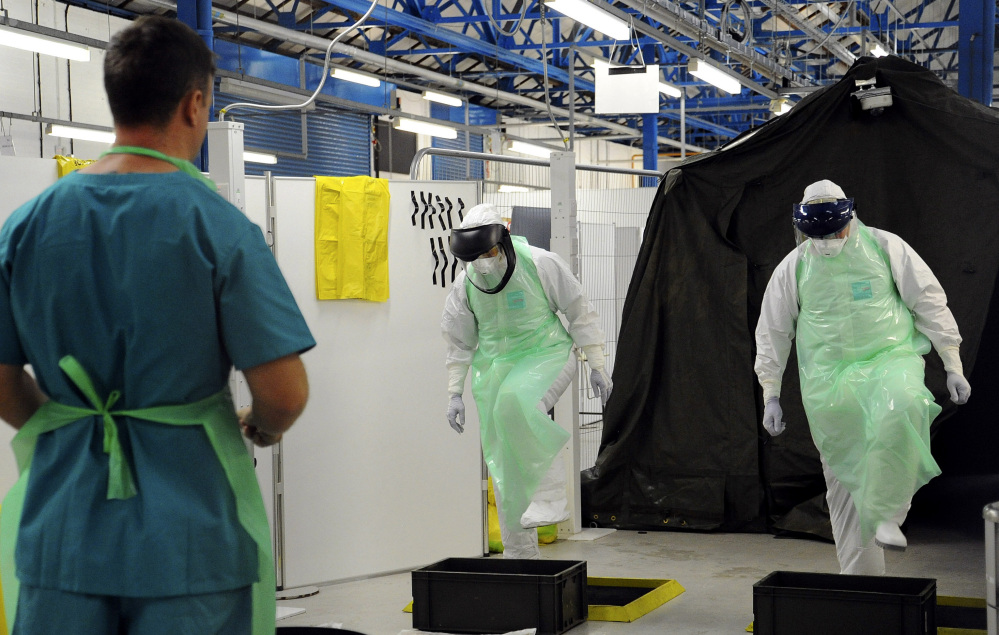BETHESDA, Md. — U.S. officials leading the fight against history’s worst outbreak of Ebola have said they know the ways the virus is spread and how to stop it. They say that unless an air traveler from disease-ravaged West Africa has a fever of at least 101.5 degrees or other symptoms, co-passengers are not at risk.
“At this point there is zero risk of transmission on the flight,” Dr. Thomas Frieden, director of the federal Centers for Disease Control and Prevention, said after a Liberian man who flew through airports in Brussels and Washington was diagnosed with Ebola last week in Dallas.
Other public health officials have voiced similar assurances, saying Ebola is spread only through physical contact with a symptomatic individual or their bodily fluids.
“Ebola is not transmitted by the air. It is not an airborne infection,” said Dr. Edward Goodman of Texas Health Presbyterian Hospital in Dallas, where the Liberian patient remains in critical condition.
Yet some scientists who have long studied Ebola say such assurances are premature – and they are concerned about what is not known about the strain now on the loose.
It is an Ebola outbreak like none seen before, jumping from the bush to urban areas, giving the virus more opportunities to evolve as it passes through multiple human hosts.
Dr. C.J. Peters, who battled a 1989 outbreak of the virus among research monkeys housed in Virginia and who later led the CDC’s most far-reaching study of Ebola’s transmissibility in humans, said he would not rule out the possibility that it spreads through the air in tight quarters.
“We just don’t have the data to exclude it,” said Peters, who continues to research viral diseases at the University of Texas in Galveston.
MUCH YET TO LEARN
Dr. Philip K. Russell, a virologist who oversaw Ebola research while heading the U.S. Army’s Medical Research and Development Command, and who later led the government’s massive stockpiling of smallpox vaccine after the Sept. 11 terrorist attacks, also said much was still to be learned. “Being dogmatic is, I think, ill-advised, because there are too many unknowns here.”
If Ebola were to mutate on its path from human to human, said Russell and other scientists, its virulence might wane – or it might spread in ways not observed during past outbreaks, which were stopped after transmission among just two to three people, before the virus had a greater chance to evolve.
The present outbreak in West Africa has killed approximately 3,400 people, and there is no medical cure for Ebola.
“I see the reasons to dampen down public fears,” Russell said. “But scientifically, we’re in the middle of the first experiment of multiple, serial passages of Ebola virus in man. … God knows what this virus is going to look like. I don’t.”
Tom Skinner, a spokesman for the CDC in Atlanta, said health officials were basing their response to Ebola on what has been learned from battling the virus since its discovery in central Africa in 1976.
Skinner also said the CDC is conducting ongoing lab analyses to assess whether the present strain of Ebola is mutating in ways that would require the government to change its policies on responding to it. The results so far have not provided cause for concern, he said.
AIRPORT SCREENINGS ADEQUATE?
Some question whether airport screenings of prospective travelers to the U.S. from West Africa can reliably detect those who might have Ebola. Frieden has said the CDC protocols used at West African airports can be relied on to prevent more infected passengers from coming to the U.S.
“One hundred percent of the individuals getting on planes are screened for fever before they get on the plane,” Frieden said Sept. 30.
“And if they have a fever, they are pulled out of the line, assessed for Ebola, and don’t fly unless Ebola is ruled out.”
But individuals who have flown recently from one or more of the affected countries suggested that travelers could easily subvert the screening procedures – and might have incentive to do so. Compared with the depleted medical resources in the West African countries of Liberia, Sierra Leone and Guinea, the prospect of hospital care in the U.S. may offer an Ebola-exposed person the only chance to survive.
A person could pass body temperature checks performed at the airports by taking ibuprofen or any common analgesic. Prospective passengers may also fear the consequences of identifying themselves as sick, said Kim Beer, of Sierra Leone, who is working to get medical supplies into the country to cope with Ebola.
Liberian officials admitted last week that the patient hospitalized in Dallas, Thomas Eric Duncan, did not report to airport screeners that he had had previous contact with an Ebola-stricken woman.
Copy the Story LinkSend questions/comments to the editors.



Success. Please wait for the page to reload. If the page does not reload within 5 seconds, please refresh the page.
Enter your email and password to access comments.
Hi, to comment on stories you must . This profile is in addition to your subscription and website login.
Already have a commenting profile? .
Invalid username/password.
Please check your email to confirm and complete your registration.
Only subscribers are eligible to post comments. Please subscribe or login first for digital access. Here’s why.
Use the form below to reset your password. When you've submitted your account email, we will send an email with a reset code.